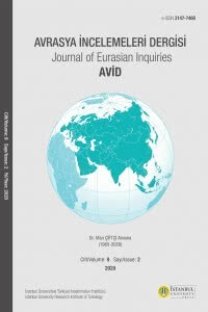Geçiş Dönemi Karadağ’ında Siyaset
Bu makalenin konusu, son yirmi yılda toplumsal ve sosyal yaşamın her alanında önemli bir dönüşüm ve değişim geçiren Karadağ'ın siyasi hayatıdır. Karadağ topraklarında yakın tarihe kadar fırtınalı geçen sosyal ve siyasi olayları aydınlatmak amacıyla yapılan çalışmalar, bibliyografya, ve bilimsel çalışmalar vs., kapsamlı değildir. Büyük olasılıkla bunun en temel sebeplerinden biri sürecin henüz bitmemiş olması ve halen çağdaş Karadağ toplumunu etkilemesidir. Dönemim öne çıkan en önemli özelliği Sosyalist Demokrat Parti’nin (bundan sonra DPS) çok partili siyasal hayat atmosferinde ve savaşın etkilerinin sürdüğü istikrarsız ortamda tüm ideolojik, siyasi, sosyal ve etnik kutuplaşmalar ile beraber yoğun uluslararası baskılara rağmen iktidarı elinde tutabilmesidir. Bu sebeple, bu çalışmada yıllardır hükümetin başında olan egemen bir siyasi varlığını rolü ve önemi mercek altına alınmakta ve çok partili sisteme geçilmesinden bu yana sosyo-politik değişiklileri analiz edilmektedir
Political Life in Montenegro in the Transition Period
The theme of this work is the political life of Montenegro during the last two decades. In the given period, the Montenegrin society is going through a major political transformation and change in all aspects of social life. The aim of this paper is to analyze the socio-political changes since the introduction of multi-party system to the present day. Previous bibliography, critical and scientific reviews in order to clarify the turbulent events in the recent social and political history of the territory of Montenegro are very fragmentary. The reasons for this probably lies in the still insufficient historical distance, in actuality of the many events of that period, whose relapses and reflections have today a significant impact on the socio-political reality of the modern Montenegrin society. The paper reviewed the two hypotheses, the role and importance of one dominant political entity that exercises power for decades. The topic of this paper is the political life of Montenegro from 1990 to the present days. A particular feature of this period is the fact that one political party (Democratic Party of Socialists, hereinafter-DPS), managed to hold power until today, in conditions of party pluralism, unstable and war-affected environments, deep ideological, political, social and ethnic divisions in society and the intense international pressures.
Keywords:
Transition, Montenegro, politics reform, political parties,
___
- ANDRIJASEVIC Z., Crnogorske Teme, IICG, Podgorica 1998.
- CUPIC C., Politika i zlo, Cigoja, Belgrade 2001.
- DARMANOVIC, S., Demokratske Tranzicije u Južnoj i JugoIstočnoj Evropi, FPN, Podgorica 2002.
- GOATI, V., Izbori u Jugoslaviji [Elections in Yugoslavia 1990-2000], CESID, Belgrade 2001.
- GOATI, V., Partije Srbije I Crne Gore u Političkoj Borbi od 1990 do 2000, Conteco, Podgorica 2000.
- JOVANOVIC P., DIMITRIJEVIĆ N., POPOVIĆ M., Savremeni Politički Sistemi, University of Montenegro, Podgorica 1998.
- KNEŽEVIĆ, R., Istorija Političke Kulture u Crnoj Gori, CID, Podgorica 2007.
- KROTZ, F., “Mediatization: A Concept with which to Grasp Media and Societal Change”. (edt. Lundby), Mediatization: Concept, Changes, Consequences, Peter Lang Publishing, New York 2009, pp. 21-40.
- QUALTER, H.T., Propaganda and Psychological Warfare, Random House, NY 1962.
- ORLOVIC, S., Moć i političke Partije, JUPN / Cigoja, Belgrade 2002.
- PAVICEVIC, V., Izborni System i Izbori u Crnoj Gori 1990-1996, CID, Podgorica 1997.
- VUKADINOVIĆ, S., Nova Politička Strategija: Transformacija Partija i Političkog Sistema u Crnoj Gori, Pokret / Pobjeda, Podgorica 1994.
- MILAS, Goran, “Razlozi Nedosljednosti: Tko i Zašto Mijenja Glasačku Odluku?”, Social Research, vol IX (2000), 4/5 (48/49); p. 473-496.
- WHITE A.R., “From Codes of Ethics to Publics Cultural Truth: A Systemic Communication View of Ethics”, European Journal of Communication, vol. IV, 1995.
- „Pobjeda“, 8. 1. 1992. Podgorica.
- „Vijesti“, 14.10. 2009. Podgorica.
- SNP Offical Website, (http://www.snp.co.me/)
- Yayın Aralığı: Yılda 2 Sayı
- Başlangıç: 2012
- Yayıncı: İstanbul Üniversitesi
Sayıdaki Diğer Makaleler
Modern Dönemde Kafkaslarda İşbirliği Modelleri
Geçiş Dönemi Karadağ’ında Siyaset
